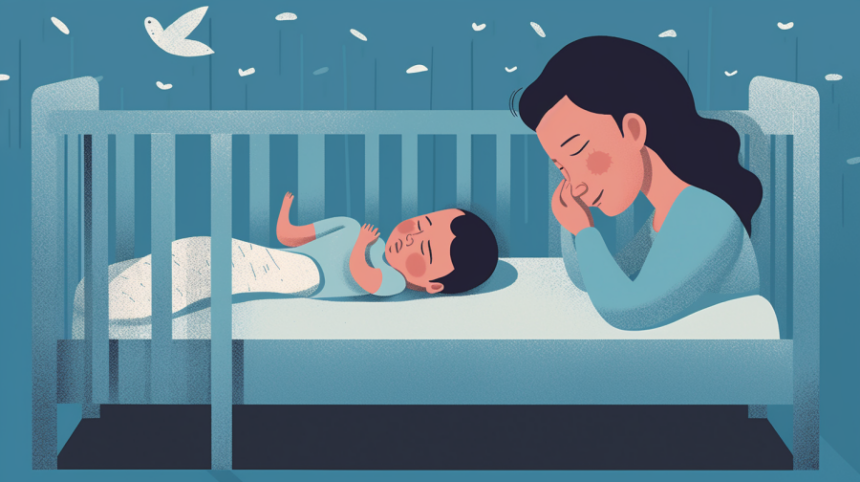Welcome to our comprehensive guide on when to begin sleep training for your baby! As a new parent, you may be wondering when it’s time to start establishing healthy sleep habits for your little one. Sleep training can be a daunting task, but with the right approach and guidance, it can be a positive experience for both you and your baby.
Why is Sleep Training Important?
Sleep is crucial for the growth and development of babies. It helps them consolidate memories, process information, and develop emotionally. Establishing healthy sleep habits early on can benefit your baby in many ways, including:
- Improved mood and behavior
- Better physical health
- Increase in cognitive development
- Enhanced immune system
Furthermore, getting enough sleep allows parents to have time to rest and recharge themselves. However, it’s important to remember that every baby is different, and there’s no one-size-fits-all approach when it comes to sleep training.
When Should You Start Sleep Training?
The ideal age to start sleep training varies from baby to baby. Generally speaking, most experts recommend starting between four and six months of age. At this stage, babies are more capable of learning how to self-soothe and establish healthy sleep patterns.
However, before starting any sleep training methods, it’s essential to ensure that your baby is ready. Here are some signs that indicate your baby might be ready for sleep training:
- Your baby is at least four months old
- Your baby has established a consistent feeding routine
- Your baby no longer needs night-time feedings
- Your baby can self-soothe, such as sucking on their fingers or pacifier
- Your baby is healthy and not experiencing any medical issues that may affect their sleep
If your baby isn’t showing any of these signs or is too young, it’s best to wait until they’re ready.
Popular Sleep Training Methods
There are various sleep training methods available, and it’s crucial to choose one that suits your parenting style and your baby’s needs. Here are some popular sleep training methods:
The Cry It Out (CIO) Method
The CIO method involves letting your baby cry for a set amount of time before checking on them. The time intervals between checks gradually increase over several days until your baby learns to self-soothe and fall asleep independently.
This method can be challenging for parents, as listening to your baby cry can be distressing. However, it can be effective in teaching babies to fall asleep without relying on parental intervention.
Fading Method
The fading method involves gradually reducing the level of parental involvement in helping the baby fall asleep. For instance, you may start by rocking or feeding your baby until they’re drowsy but still awake. Over several nights, you slowly reduce the amount of time spent rocking or feeding until your baby can fall asleep independently.
This method is less intense than the CIO method and can be more suitable for parents who prefer a gentler approach. However, it may take longer for babies to learn how to self-soothe using this method.
No Tears Method
The no tears method involves responding promptly to your baby’s cries and providing comfort without allowing them to become fully dependent on parental intervention. This method focuses on establishing a consistent bedtime routine, such as bath time, reading a story, and singing a lullaby.
This method can be effective for babies who may have difficulty falling asleep due to separation anxiety. However, it may take longer for babies to learn how to fall asleep independently using this method.
Tips for Successful Sleep Training
Regardless of the sleep training method you choose, here are some tips that can help make the process smoother:
- Establish a consistent bedtime routine
- Create a sleep-conducive environment by keeping the room dark and quiet
- Avoid feeding or rocking your baby to sleep
- Be patient and consistent with the chosen sleep training method
- Don’t give up if your baby has setbacks or regression in their sleep habits. It’s normal for babies to experience disruptions in their sleep patterns.
Baby Sleep Regression
Sleep regression is common among babies and occurs when they experience disruptions in their regular sleep patterns. Some common causes of sleep regression include developmental milestones, illnesses, and teething.
If your baby is experiencing sleep regression, it’s essential to be patient and provide comfort during this challenging time. You may need to adjust your sleep training methods or routines temporarily until your baby’s sleep patterns return to normal.
Conclusion
Sleep training can be a challenge, but it’s an essential part of establishing healthy sleep habits for your baby. Remember that every baby is different, and there’s no one-size-fits-all approach when it comes to sleep training. Choose a method that works best for you and your baby’s needs, and don’t hesitate to seek professional guidance if you need additional support.
With patience, consistency, and a supportive approach, you can help your baby learn how to fall asleep independently and establish healthy sleep habits that will benefit them for years to come.

